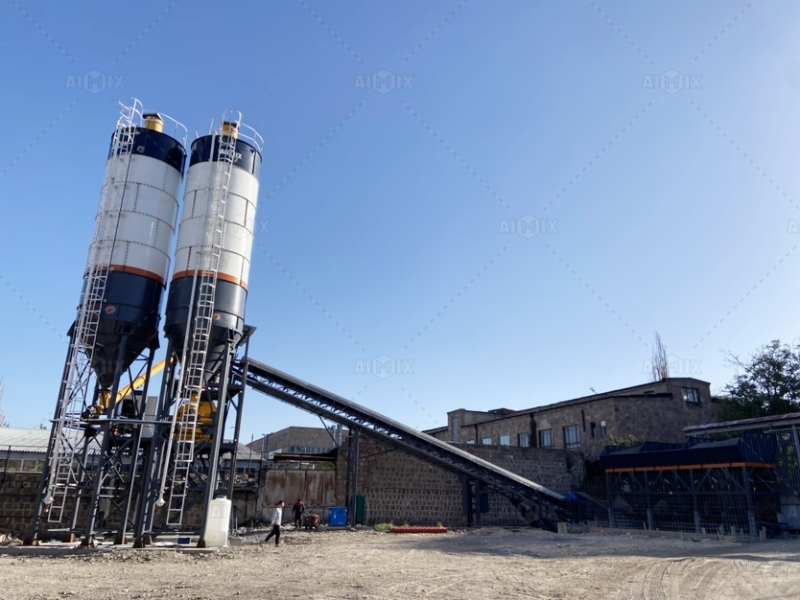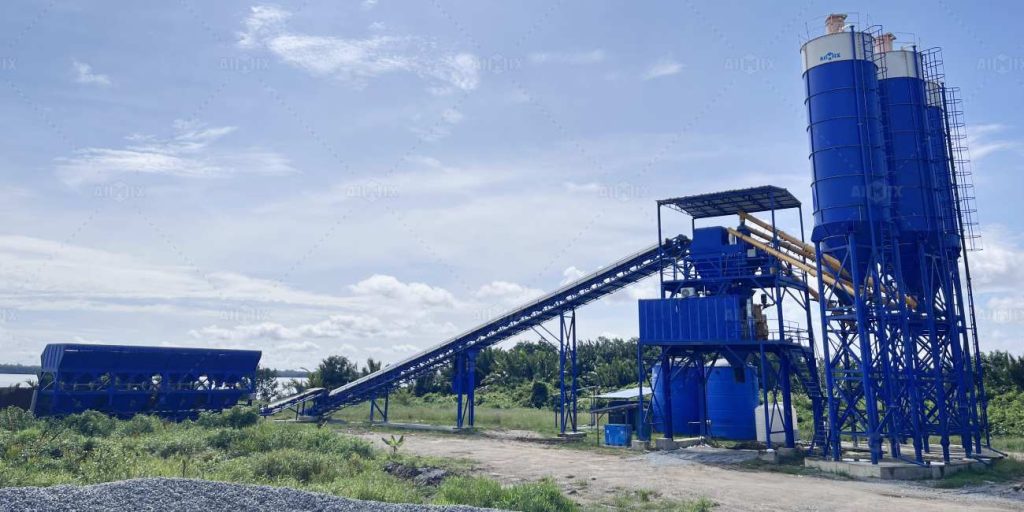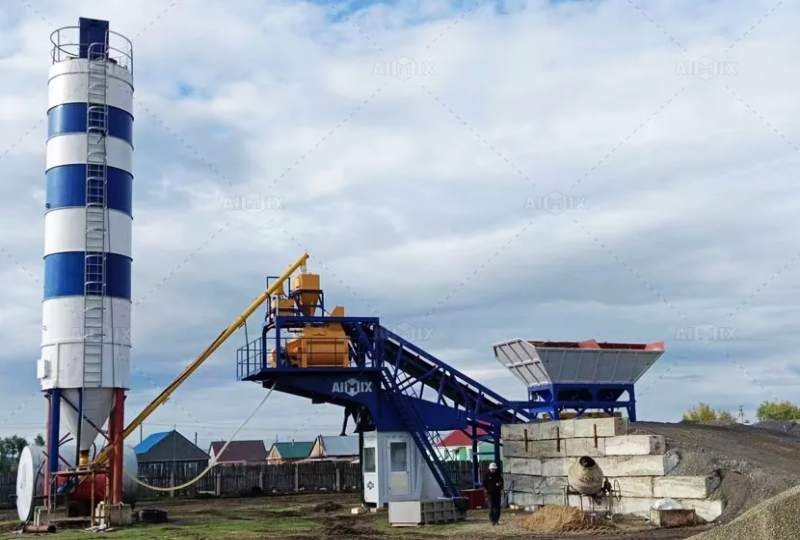Batching plants are integral to modern construction, enabling the efficient and precise production of concrete for a wide range of projects. Whether you’re working on a small residential building or a large-scale infrastructure project, choosing the right batching plant is crucial to meeting project timelines and maintaining quality. In this article, we will explore the different types of batching plant available, from compact units to high-capacity systems, and compare features such as stationary concrete batching plants, mobile concrete mixing plants, and small concrete batch plants to help you select the right system for your needs.

What is a Batching Plant?
A batching plant is a facility used to mix ingredients such as cement, water, aggregates, and additives in specific proportions to produce concrete. The goal is to ensure that the concrete produced is of consistent quality, strength, and durability. Batching plants come in different configurations based on project size, site location, and required production capacity. The main types of batching plants include stationary concrete batching plants, mobile concrete mixing plants, and small concrete batch plants.
1. Stationary Concrete Batching Plants
Stationary concrete batching plants are designed for high-volume production and are typically used in large-scale construction projects. These plants are fixed at one location and are ideal for projects with long-term concrete production needs, such as highways, bridges, and large residential complexes.
Key Features of Stationary Concrete Batching Plants:
- High Production Capacity: Stationary plants are capable of producing large volumes of concrete per hour, making them ideal for continuous production at large construction sites.
- Precise Mixing: With advanced control systems, stationary batching plants provide highly accurate measurements of ingredients, ensuring that each batch of concrete meets the required specifications.
- Durability and Reliability: These plants are built to withstand the demands of high-volume production and are designed to last for many years with minimal maintenance.
- Large Storage Capacity: Stationary plants usually have large storage silos for aggregates and cement, allowing for greater operational efficiency and less frequent material replenishment.
These plants are most suited for projects that require a stable, consistent supply of high-quality concrete over extended periods. The high initial cost of stationary batching plants is typically offset by the reduced operational costs and high production capabilities in the long run.

2. Mobile Concrete Mixing Plants
Mobile concrete mixing plants are designed for flexibility and mobility. Unlike stationary plants, these units can be moved from one construction site to another, making them ideal for projects that are spread across multiple locations or require frequent changes in the project site.
Key Features of Mobile Concrete Mixing Plants:
- Portability: Mobile batching plants are mounted on wheels or trailers, allowing them to be easily relocated to different project sites. This is ideal for temporary or remote projects where a stationary setup is not feasible.
- Compact Design: Mobile plants are more compact than stationary units, which makes them easier to transport and set up. They also take up less space on the construction site.
- Flexibility: Mobile concrete mixing plants are adaptable to a wide range of project requirements, from small residential constructions to medium-sized commercial developments.
- Fast Setup and Shutdown: These plants are designed for quick deployment, making them suitable for projects with tight timelines or locations that require rapid mobilization.
Mobile batching plants offer the advantage of flexibility, which is essential for projects with a limited timeline or those spread out over a wide geographical area. While they generally have a lower production capacity than stationary plants, their portability and quick setup make them ideal for specific project needs.
3. Small Concrete Batch Plants
Small concrete batch plants are designed for smaller-scale projects or sites where space and concrete requirements are limited. These plants are highly efficient and offer an affordable solution for producing smaller quantities of concrete.
Key Features of Small Concrete Batch Plants:
- Compact Size: As the name suggests, small concrete batch plants are compact and easy to fit into tight spaces, making them perfect for residential construction, small commercial buildings, or small infrastructure projects.
- Low Initial Investment: Compared to larger batching plants, small concrete batch plants are more affordable. They provide a cost-effective option for contractors working with lower budgets or small-scale projects.
- Ease of Operation: These plants are typically easy to operate and maintain, which helps reduce labor costs and simplify day-to-day operations.
- Lower Capacity: Small batch plants produce concrete in smaller quantities, typically in the range of 10-20 cubic meters per hour. While this may not be suitable for high-demand sites, it is perfect for small projects or for use as a backup system at larger plants.
Small concrete batch plants are popular with contractors who need a flexible, budget-friendly solution for smaller projects. These plants are also commonly used for producing concrete for ready-mix companies that need a local batching solution or backup capacity for large-scale operations.

Comparison: Stationary vs. Mobile vs. Small Concrete Batch Plants
1. Production Capacity
- Stationary batching plants offer the highest production capacity, often exceeding hundreds of cubic meters per hour.
- Mobile concrete mixing plants have moderate production capacities, generally suitable for medium to large-scale projects.
- Small concrete batch plants are designed for lower production volumes, making them ideal for smaller projects.
2. Portability and Flexibility
- Stationary plants are fixed and not movable, making them suitable for long-term, large-scale projects.
- Mobile plants are highly portable and can be relocated to different job sites, ideal for projects that require flexibility.
- Small batch plants are also compact and can be moved between locations, but their focus is on lower volume production.
3. Cost and Investment
- Stationary batching plants have a higher initial cost but offer lower operational costs in the long run due to their efficiency and high capacity.
- Mobile concrete mixing plants are typically more affordable than stationary plants but still offer good production capacity for medium-scale projects.
- Small concrete batch plants are the most cost-effective and provide the lowest upfront investment, making them perfect for smaller operations.
4. Maintenance and Longevity
- Stationary batching plants generally require more maintenance due to their larger and more complex components but are designed for longer operational lifespans.
- Mobile plants have lower maintenance needs but may experience higher wear and tear due to frequent transportation and setup.
- Small batch plants are simpler to maintain and are typically more suited for short-term operations, though they can also last for many years with proper care.
Conclusion
Choosing the right type of batching plant for your construction project depends on the scale of your work, your budget, and how much flexibility you need. Stationary concrete batching plants are best suited for high-capacity, long-term projects, offering stability and high production rates. Mobile concrete mixing plants provide portability and flexibility, making them ideal for projects with shifting locations or tight timelines. Finally, small concrete batch plants offer an affordable solution for smaller projects or as a backup system for larger operations.
Each type of batching plant has its advantages and is tailored to specific needs. By carefully considering your project requirements, you can select the right batching plant to enhance productivity, reduce costs, and ensure consistent concrete quality throughout the construction process.